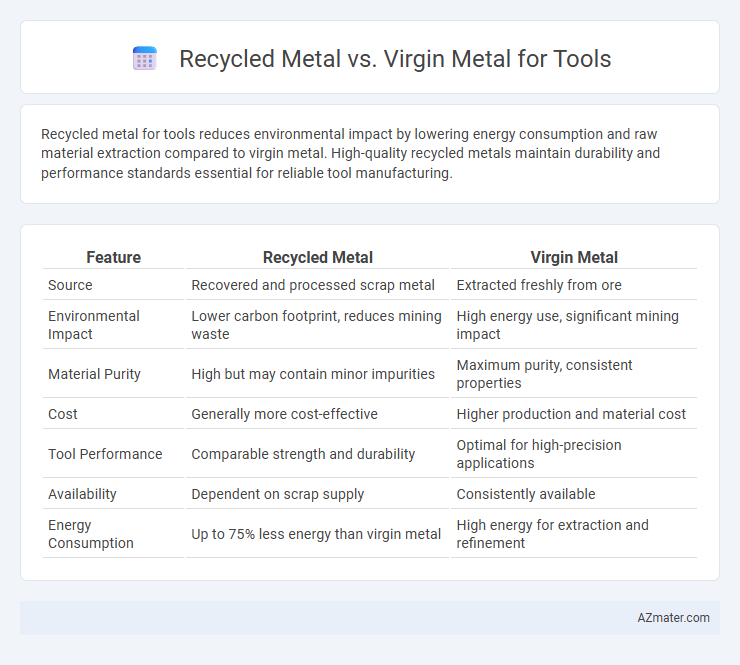Recycled metal for tools reduces environmental impact by lowering energy consumption and raw material extraction compared to virgin metal. High-quality recycled metals maintain durability and performance standards essential for reliable tool manufacturing.
Table of Comparison
| Feature | Recycled Metal | Virgin Metal |
|---|---|---|
| Source | Recovered and processed scrap metal | Extracted freshly from ore |
| Environmental Impact | Lower carbon footprint, reduces mining waste | High energy use, significant mining impact |
| Material Purity | High but may contain minor impurities | Maximum purity, consistent properties |
| Cost | Generally more cost-effective | Higher production and material cost |
| Tool Performance | Comparable strength and durability | Optimal for high-precision applications |
| Availability | Dependent on scrap supply | Consistently available |
| Energy Consumption | Up to 75% less energy than virgin metal | High energy for extraction and refinement |
Introduction to Metal Choices in Tool Manufacturing
Recycled metal and virgin metal serve as primary material options in tool manufacturing, each offering distinct advantages regarding sustainability and performance. Recycled metals reduce environmental impact by minimizing the need for raw ore extraction, while virgin metals provide consistent material properties and purity essential for high-precision tooling. Selecting the appropriate metal depends on balancing environmental considerations with the mechanical requirements specific to the tool's application.
What is Recycled Metal?
Recycled metal refers to scrap or used metals that have been collected, melted down, and reformed into new products, significantly reducing the need for virgin metal extraction. It maintains comparable strength and durability to virgin metal, making it a sustainable choice for manufacturing tools without compromising quality. Utilizing recycled metal in tool production lowers energy consumption and minimizes environmental impact by reducing mining activities and greenhouse gas emissions.
Understanding Virgin Metal
Virgin metal, sourced directly from mined ore, offers consistent chemical composition and mechanical properties crucial for precision tools requiring high strength and durability. Its purity ensures minimal contamination, reducing the risk of defects and enhancing tool performance under extreme conditions. Understanding virgin metal's role highlights its importance in applications where reliability and structural integrity are paramount compared to recycled alternatives.
Environmental Impact: Recycled vs Virgin Metal
Recycled metal significantly reduces environmental impact by lowering energy consumption by up to 85% compared to virgin metal extraction and processing. Mining virgin metal results in habitat destruction, soil erosion, and increased greenhouse gas emissions, while recycled metal minimizes these adverse effects by utilizing existing materials. Choosing recycled metals for tools supports waste reduction, reduces reliance on finite natural resources, and decreases carbon footprint throughout the metal lifecycle.
Cost Comparison: Recycled and Virgin Metal for Tools
Recycled metal significantly reduces production costs in tool manufacturing due to lower raw material expenses and decreased energy consumption compared to virgin metal extraction. Virgin metals require extensive mining and refining processes, increasing overall costs and environmental impact. Choosing recycled metal not only cuts expenses by up to 30% but also supports sustainable resource management and promotes circular economy practices in the tooling industry.
Quality and Performance Differences
Recycled metal used in tools often maintains comparable strength and durability to virgin metal when processed with advanced refining techniques, ensuring consistent quality. Virgin metal typically offers superior purity and uniformity, which can enhance tool precision and performance, especially in high-stress applications. However, modern recycling processes minimize impurities, making recycled metals increasingly reliable for producing high-performance tools with environmental benefits.
Energy Consumption in Metal Production
Recycled metal production consumes up to 85% less energy compared to virgin metal extraction and processing, significantly reducing carbon emissions and environmental impact. Using recycled metal for tools minimizes the need for energy-intensive mining, smelting, and refining processes inherent to virgin metal production. This energy efficiency makes recycled metals a sustainable choice for manufacturing high-quality, durable tools.
Availability and Supply Chain Considerations
Recycled metal offers improved availability by reducing dependency on finite natural resources and mitigating supply chain disruptions caused by mining constraints. Virgin metal supply chains often face volatility due to extraction costs, geopolitical factors, and environmental regulations, impacting consistent tool production. Utilizing recycled metals enhances supply chain resilience and promotes sustainable sourcing in the tool manufacturing industry.
Case Studies: Tools Made from Recycled vs Virgin Metal
Case studies comparing tools made from recycled metal versus virgin metal demonstrate that recycled metal tools often meet or exceed performance standards while significantly reducing environmental impact. Research from the Metal Fabrication Institute shows recycled steel tools maintain comparable tensile strength and durability to virgin metal counterparts, with energy consumption reduced by up to 58%. Furthermore, lifecycle assessments reveal tools produced from recycled metal contribute to a 40% reduction in carbon emissions, validating the economic and ecological benefits for manufacturers and consumers alike.
Making the Sustainable Choice for Tool Production
Recycled metal significantly reduces environmental impact by cutting energy consumption up to 95% compared to virgin metal extraction, making it the sustainable choice for tool production. Using recycled metals also lowers carbon emissions and conserves natural resources, supporting circular economy principles in manufacturing. High-quality recycled steel and aluminum provide equivalent durability and performance, ensuring reliable, eco-friendly tools without compromising strength or longevity.

Infographic: Recycled metal vs Virgin metal for Tool
 azmater.com
azmater.com